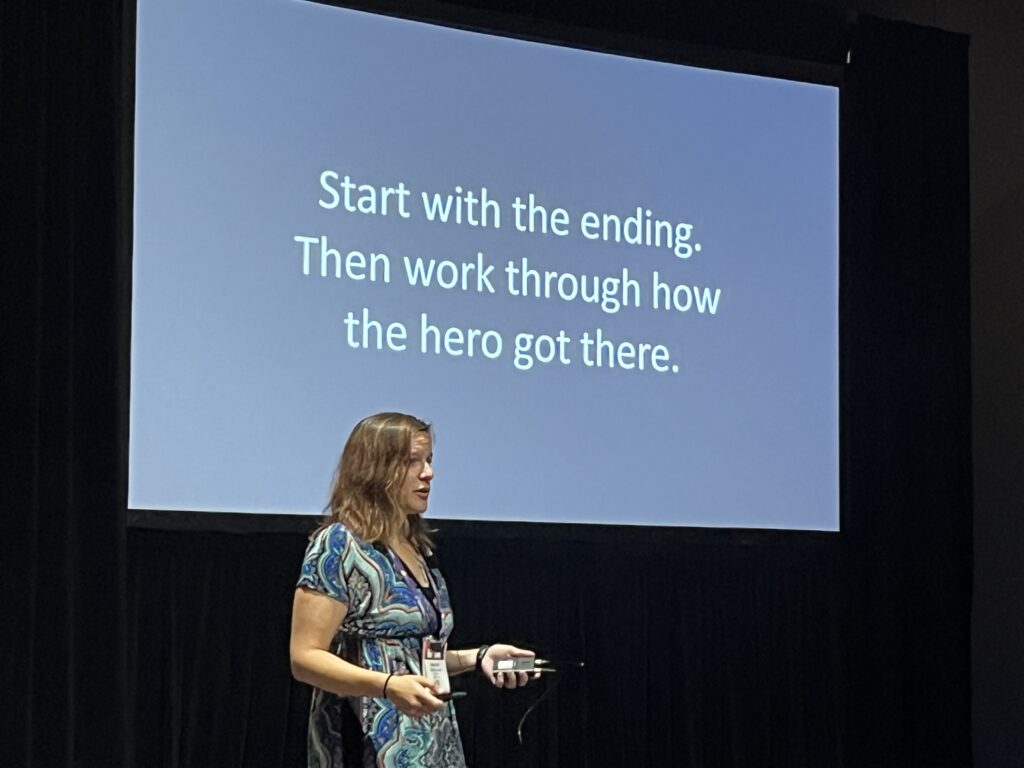
Christopher Lott
October 6, 2023
With the advent of accessible artificial intelligence, the landscape of content marketing is changing faster than ever before. Yet the hundreds of professionals who converged in Washington, DC, for Content Marketing World aren’t daunted by the pace of change.
Instead, the largest content marketing conference in the world showed that they’re embracing the emergence of AI and making content that’s even more relevant. Content marketers work to stay ahead of change and ensure audiences have the information they need to keep web traffic flowing and conversions converting.
If you couldn’t make it to our nation’s capital for CMWorld, well, you missed out. But here’s the next best thing: three themes that emerged throughout the conference that can help you keep your work at the forefront of the content marketing evolution.

If there was one topic that was on everyone’s mind at CMWorld, it was artificial intelligence. The rise of AI tools such as ChatGPT, Midjourney, Copy.ai, Jasper, and dozens of others led to a lot of conversation about what these products mean for the future of content marketing.
The consensus was far from “the sky is falling.” While there’s plenty of chatter in the press about AI taking over roles filled by human content creators, the reality is more nuanced.
When it comes to search engine optimization, Fire&Spark’s Dale Bertrand reminded workshop attendees that the latest update to Google Analytics 4 means that rules-based SEO practices are a thing of the past. Instead, Google’s AI-powered, human-rated search results monitor audience behavior and reward the most compelling content with higher search rankings.
DemandJump’s Ryan Brock echoed this sentiment in a mock funeral for SEO practices that have passed away. He included the sales funnel (check out Stamats AVP of Digital Strategy Stu Eddins’ take on the new customer journey in higher ed enrollment for more), domain authority, and keyword struggles on his memorial list. These and more have gone the way of the dodo, Brock said, thanks to the rise of AI-powered semantic search.
AI presents opportunities, too. As Croud’s Avinash Kaushik noted, and dozens of Expo Hall vendors reinforced, AI has the power to help marketers “deliver customer delight and business success at a scale that is extraordinary.”
Speaker after speaker agreed, GA4 has changed the game. But how can content marketers compete with a flood of AI-generated content?
The term “commodity content” was on everyone’s lips at CMWorld, and it’s key to understanding why human content marketers aren’t too worried about AI taking away our jobs (yet).

Commodity content is everywhere these days. AI can generate thousands of words of generic copy in almost an instant, but this noisy content has little value for consumers. It is a restating of authoritative sources found elsewhere on the web, provides little insight, and does a poor job of helping audiences answer the questions that motivate them.
That’s why GA4 deprioritizes commodity content in search results, and it’s why humans still have something to say.
To differentiate your content from what the robot can write, keep these tips from CMWorld experts like Ann Handley, Andrew Davis, and Melanie Deziel in mind:
Far from a niche corner of the marketing world, the rise of semantic search and changing customer expectations for relevant, on-demand answers mean people are still crucial to creating content for brands and businesses that need authentic connections to consumers.
Robert Rose (Content Marketing Institute), Bennie Johnson (American Marketing Association), Beverly Jackson (Zillow), and even headlining actress/director/producer Elizabeth Banks made it clear in their presentations: content marketing is all grown up.
No longer just “blogging,” content marketing has evolved to become the spine, the center, and often the sum total of marketing itself. From data analytics and lead generation through list management, sales, social media, and yes, blogs, content marketing is modern marketing.
Nimble organizations ensure that marketing leaders are at the table for important product development conversations, and those marketing leaders will have content strategy at the top of their to-do lists. Branding and visual development, voice and tone, data analytics, ad spend and so much more are, at their core, content processes.
Content marketers study, analyze, and answer audience questions. We drive traffic through all phases of the sales funnel, craft content that’s optimized for search, speak to the audience in their voice, and advance organizational goals through people-focused content that robots just can’t match.
Content marketers aren’t worried about AI taking our jobs, at least not yet. For now, the global community is focused on honing our craft and leveraging actionable data, because this is what will continue to insulate our organizations from the robot invasion and keep insightful, optimized content flowing to the audiences who need it most.
Want to stay at the forefront of content marketing? Schedule a time with Mariah Obiedzinski Tang to learn how Stamats can help your content work smarter.